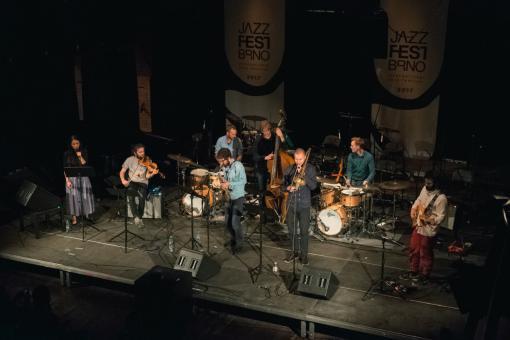In the intimate setting of the Theatre Husa na provázku the programme director of Brno’s JazzFest, Vilém Spilka decided to hold two smaller chamber concerts. It was a good decision since the audience had an opportunity from up close to see soloists swapping with musicians and so become part of an interesting event.
The driver of the first half of the evening was the young but experienced Czech saxophonist Michal Wróblewski, known here as the leader of the jazz groups Mocca Malacco and E Converso or as a former member of the ‘Celtic’ group Bran. Since 2014 he has lived and studied in Norway, where he has been developing primarily his compositional and organisational skills as part of his master’s course. Last year for example in an interview for Czech Radio Jazz described his master’s project, which is made up both of compositional work and improvisation and which is ‘founded on research into the relationship between the musical process and the listener’. Part of his studies is also a grant which the student can use as they wish, and on this the saxophonist said: ‘I have so far spent it on recording, because that seems the most sensible. Since people rarely get support for that. But I will also have to invest in the touring that awaits us.’
Last year Wróblewski brought out an album with the KIAP trio, which he makes up with two Norwegian colleagues, and it is with them and another four musicians and a signer that he is now performing at JazzFest. His eight-member Ensemble works from improvisation, offering a very free form of jazz, but they are able to build their works to a massive finale. The ensemble includes not only an unusual combination of melodic instruments up front (saxophone, trombone and violin), but also the pairing of the drums and the work of the double bass player Martin Morland, who expands the already colourful sound palette of the group swapping double bass and bass guitar. A key member of the group is also the guitarist Magnus Grimnes, who enhances the possibilities of his instrument not only with electronic effects but also with ‘mechanical effects’ (playing with a cloth ribbon). Although the approximately hour-long block offered space for solos and sound displays by individual players, the strongest moments were the interplay of the whole ensemble, including the voice of the singer Seshen. She initially held back, but during the evening proved to be one of the more important actors.
While before the concert I took the new Wróblewski Ensemble as a great unknown, I know the big band Concept Art Orchestra led by Štěpánka Balcarová from the Anděl prizewinning album The Prague Six. I have followed the activity of this body (including the Karel Krautgartner Composition Competition or her versions of Christmas carols) and I am overjoyed that someone here takes such great pains to look after a large group, which focuses almost solely on compositions (or arrangements) by young Czech composers. The Brno concert not only confirmed but in fact significantly increased my enthusiasm. I gained the impression that two years after the recording of the mentioned album the orchestra and especially its composers are another step more mature and masterful.
In Brno the orchestra offered the concept, which formally arose from the album The Prague Six. Each of the six ‘court’ composers (‘The Prague Six’) presented one roughly ten-minute piece, however a different work (and in one case an arrangement of a standard) than on the album. As the strongest of these strong compositions I see he work by Štěpánka Balcarová built on a repeating piano motif, above which the whole big band had space to perform. The pianist Vít Křišťan in his composition used work with rhythm (in the introductory passage percussion and piano) and with contrasts (the higher tones of the piano and the depths of the wind instruments) and a dialogue of soloists (Luboš Sokup) and orchestra gradually spilled over into a more dissonant passage, which created a counterweight to the preceding brilliantly played My Funny Valentine in the version by Jan Jirucha.
However the Concept Art Orchestra concert was exceptionally strong as a whole. The introductory work by Tomáš Sýkora offered a long saxophone solo by David Fárek and excellent work with dynamics. The rugged and rhythmically exploratory composition by Luboš Soukup with significant elements of humour as if sketching a cinematic tale. And the composition Sparkle by Martin Brunner created a perfect finale, after which logically there had to be an encore. This was a shorter and older work by Štěpánka Balcarová Song For Children, arranged only for wind instruments.
In the three years that the Concept Art Orchestra under the leadership of Štěpánka Balcarová has operated in Prague it has become a phenomenon of contemporary Czech jazz. In Brno the orchestra has shown not only the high level of its playing both of individuals and as a whole, but at the same time has offered a high quality picture of the creative potential of Czech composers who are still part of the younger generation but becoming a certain and constant part of our scene. These are composers who are not frightened to write courageous, exploratory and at the same time frequently entertaining and accessible works for the traditional big-band line-up.
Michal Wróblewski Ensemble, Concept Art Orchestra, as part of the JAZZFESTBRNO festival. 5 April 2017, 7.30 p.m., Divadlo Husa na provázku, Brno































